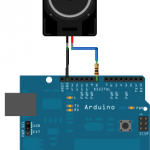1. Connect the red wire of the buzzer to GPIO Pin 5 and the black one to GPIO ground
2. Copy the following code into buzzer.py
3. Run it with this command: sudo python3 buzzer.py
4. You can also use this as a module in your robot project.
import RPi.GPIO as GPIO #import the GPIO library
import time #import the time library
class Buzzer(object):
def __init__(self):
GPIO.setmode(GPIO.BCM)
self.buzzer_pin = 5 #set to GPIO pin 5
GPIO.setup(self.buzzer_pin, GPIO.IN)
GPIO.setup(self.buzzer_pin, GPIO.OUT)
print("buzzer ready")
def __del__(self):
class_name = self.__class__.__name__
print (class_name, "finished")
def buzz(self,pitch, duration): #create the function “buzz” and feed it the pitch and duration)
if(pitch==0):
time.sleep(duration)
return
period = 1.0 / pitch #in physics, the period (sec/cyc) is the inverse of the frequency (cyc/sec)
delay = period / 2 #calcuate the time for half of the wave
cycles = int(duration * pitch) #the number of waves to produce is the duration times the frequency
for i in range(cycles): #start a loop from 0 to the variable “cycles” calculated above
GPIO.output(self.buzzer_pin, True) #set pin 18 to high
time.sleep(delay) #wait with pin 18 high
GPIO.output(self.buzzer_pin, False) #set pin 18 to low
time.sleep(delay) #wait with pin 18 low
def play(self, tune):
GPIO.setmode(GPIO.BCM)
GPIO.setup(self.buzzer_pin, GPIO.OUT)
x=0
print("Playing tune ",tune)
if(tune==1):
pitches=[262,294,330,349,392,440,494,523, 587, 659,698,784,880,988,1047]
duration=0.1
for p in pitches:
self.buzz(p, duration) #feed the pitch and duration to the function, “buzz”
time.sleep(duration *0.5)
for p in reversed(pitches):
self.buzz(p, duration)
time.sleep(duration *0.5)
elif(tune==2):
pitches=[262,330,392,523,1047]
duration=[0.2,0.2,0.2,0.2,0.2,0,5]
for p in pitches:
self.buzz(p, duration[x]) #feed the pitch and duration to the function, “buzz”
time.sleep(duration[x] *0.5)
x+=1
elif(tune==3):
pitches=[392,294,0,392,294,0,392,0,392,392,392,0,1047,262]
duration=[0.2,0.2,0.2,0.2,0.2,0.2,0.1,0.1,0.1,0.1,0.1,0.1,0.8,0.4]
for p in pitches:
self.buzz(p, duration[x]) #feed the pitch and duration to the func$
time.sleep(duration[x] *0.5)
x+=1
elif(tune==4):
pitches=[1047, 988,659]
duration=[0.1,0.1,0.2]
for p in pitches:
self.buzz(p, duration[x]) #feed the pitch and duration to the func$
time.sleep(duration[x] *0.5)
x+=1
elif(tune==5):
pitches=[1047, 988,523]
duration=[0.1,0.1,0.2]
for p in pitches:
self.buzz(p, duration[x]) #feed the pitch and duration to the func$
time.sleep(duration[x] *0.5)
x+=1
GPIO.setup(self.buzzer_pin, GPIO.IN)
if __name__ == "__main__":
a = input("Enter Tune number 1-5:")
buzzer = Buzzer()
buzzer.play(int(a))
(Visited 16,813 times, 1 visits today)


One thought on “How to play piezo buzzer tunes on Raspberry Pi GPIO with PWM”
Comments are closed.